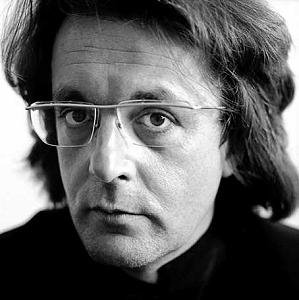Dusapin's New Opera
 It is always a pleasure to spend some time at the Santa Fe Opera in the summer, but there are plenty of opera festivals in Europe we would love to be reviewing, too. Jens is going to have more from Munich, and here is one bit of news from the Festival d'Aix-en-Provence, where Pascal Dusapin premiered his new opera, Passion, on June 29 in the restored Théâtre du Jeu de paume. The commission came from Stéphane Lissner, when he was director of the Aix Festival, with the instruction to "echo the operas of Claudio Monteverdi in orchestration or by revisiting their themes." Renaud Machart had a review (Pascal Dusapin livre son chef-d'oeuvre lyrique, July 3) in Le Monde (my translation):
It is always a pleasure to spend some time at the Santa Fe Opera in the summer, but there are plenty of opera festivals in Europe we would love to be reviewing, too. Jens is going to have more from Munich, and here is one bit of news from the Festival d'Aix-en-Provence, where Pascal Dusapin premiered his new opera, Passion, on June 29 in the restored Théâtre du Jeu de paume. The commission came from Stéphane Lissner, when he was director of the Aix Festival, with the instruction to "echo the operas of Claudio Monteverdi in orchestration or by revisiting their themes." Renaud Machart had a review (Pascal Dusapin livre son chef-d'oeuvre lyrique, July 3) in Le Monde (my translation):Pascal Dusapin is the the most celebrated living French classical composer today, after his august elder Henri Dutilleux. In the past, his stage pieces were often marked by too many strings (ficelles), too much copy-and-paste (or cut-out/resew, if you rather), too many cosmetic effects, etc. Perelà, Uomo di fumo, premiered at the Opéra de Paris in 2003, strikes us as the worst example. So it is with that much more pleasure that one greets Passion, his new work, 90 minutes of music of extraordinary refinement, unreleased tension, density without filler. The paradox of this success is that, while making reference to known music and libretto texts, Pascal Dusapin gives the impression of never having been more fresh or spontaneous in invention.
Bell-like pinched strings, blazes of brass, echos of a choir of soloists with celestial or infernal voices, poetic electronic transformations, the continuum of the electric organ (the young Dusapin's instrument), the strangled voice of an oud with foreign intonation, the desolate isolation of the keyboard at the edge of the void, all of this seduces and, more than anything, overwhelms. And we love that the remarkable libretto (in Italian, by Dusapin himself) says nothing about what animates it dramatically -- nothing, that is, not more than a Beckett play, than Marguerite Duras's India Songs, or than Andrei Tarkovski's Stalker. Nothing, that is, everything about the mystery of the obscure passions that drive us.
What is it about wordless choruses these days? The French conductor Franck Ollu was at the podium, and Machart praises him and the soloists Barbara Hanigan and Georg Nigl. We await the recording or, even better, the DVD. See some pictures here, Mark Berry's review, Jorg van Uthmann's review, and Dusapin's interview in Le Figaro.
 It is always a pleasure to spend some time at the Santa Fe Opera in the summer, but there are plenty of opera festivals in Europe we would love to be reviewing, too. Jens is going to have more from Munich, and here is one bit of news from the Festival d'Aix-en-Provence, where Pascal Dusapin premiered his new opera, Passion, on June 29 in the restored Théâtre du Jeu de paume. The commission came from Stéphane Lissner, when he was director of the Aix Festival, with the instruction to "echo the operas of Claudio Monteverdi in orchestration or by revisiting their themes." Renaud Machart had a review (Pascal Dusapin livre son chef-d'oeuvre lyrique, July 3) in Le Monde (my translation):
It is always a pleasure to spend some time at the Santa Fe Opera in the summer, but there are plenty of opera festivals in Europe we would love to be reviewing, too. Jens is going to have more from Munich, and here is one bit of news from the Festival d'Aix-en-Provence, where Pascal Dusapin premiered his new opera, Passion, on June 29 in the restored Théâtre du Jeu de paume. The commission came from Stéphane Lissner, when he was director of the Aix Festival, with the instruction to "echo the operas of Claudio Monteverdi in orchestration or by revisiting their themes." Renaud Machart had a review (Pascal Dusapin livre son chef-d'oeuvre lyrique, July 3) in Le Monde (my translation):
... "echo the operas of Claudio Monteverdi in orchestration or by revisiting their themes"
ReplyDeleteI believe that Monteverdi's later operas had a few more characters than do Dusapin's 'Passion' or 'Uomo', or Saariaho's 'L'Amour de Loin' or 'Adriana Mater' [though a smaller orchestra than used in his earliest opera].
"What is it about wordless choruses these days?"
You mean ionarts doesn't 'groove on' the wordless choruses in Philip Glass's 'Satyagraha', 'Waiting for the Barbarians', or 'Appomattox'?
@
Good point about Monteverdi. I haven't seen the Dusapin, so I cannot say much more about it.
ReplyDeleteAs for the choruses, yeah, I groove on them just fine. Just wondering if they might be becoming a -- what's the word -- cliché?